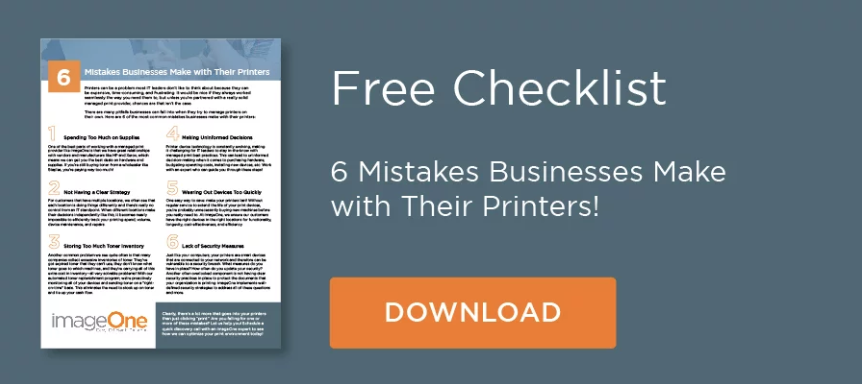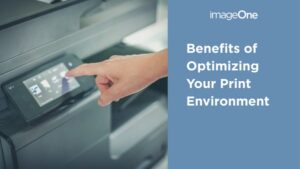The next time your business needs printers or copiers you will no doubt have to make a decision that many companies struggle with.
Should you buy it or lease it?
If you don’t know the answer, you are not alone. I get asked this question almost every day by my clients, and the answer isn’t the same for everyone. Before you make that decision let me share a bit of what I have learned over the years.
When I look at my client base, about 80% of the businesses, banks, and medical practices in and around the Detroit area (where I work) lease their copiers. Just 20 years ago the ratio was more like 50/50.
So, why the significant increase in the number of leases? The main reason is that printer technology changes so fast with copier/multifunction devices that it may pay to lease rather than buy.
After all, a copier isn’t a copier anymore. Back in the ’80s, and even the ’90s, copiers just copied. Today, these multifunctional devices can copy, print, scan, fax, and are an integral part of the document management of a professional office. With so many businesses attempting to go paperless, the copier/multifunction device becomes a powerful technology tool.
I know it can seem a bit confusing but to help you figure out which option is best for you, so let’s take a look at the pros and cons of both leasing and buying technology equipment, plus the questions you should ask to ensure you get the best deal.
The Benefits of Leasing a Printer
- Leasing keeps your equipment up-to-date. Copiers and printers eventually become obsolete. With a lease, you pass the financial burden of obsolescence to the equipment leasing company.
For example, let’s say you have a two-year lease on a copy machine. After that lease expires, you’re free to lease whatever equipment is newer, faster, and cheaper. (This is also a reason my wife prefers to lease her cars.) In fact, 65 percent of respondents who were surveyed said that the ability to have the latest equipment was leasing’s number-one perceived benefit.
- Know your monthly expenses. With a lease, you have a pre-determined monthly cost, which can help you budget more effectively.
- No down payment. Many small businesses struggle with cash flow and must keep their cash available to help grow their business. Leases rarely require a down payment, so you can acquire new equipment without tapping into much-needed funds.
- Keep up with your competition. Leasing can enable your small business to acquire sophisticated technology that might be otherwise unaffordable. The result: You’re better able to keep up with your larger competitors without draining your financial resources.

The Challenges of Leasing a Printer
- You’ll pay more in the long run. Ultimately, leasing is almost always more expensive than purchasing. For example, a $4,000 copier would typically cost a total of $5,040 if leased for three years at $140 per month, but only $4,000 (plus sales tax) if purchased outright.
- You still have to keep paying even if you stop using the equipment. Depending on the lease terms, you may have to make payments for the entire lease period, even if you no longer need the equipment, which can happen if your business changes.
The Benefits of Buying a Printer
- It’s so easy. Buying equipment is simple. You decide what you need, and then go buy it. However, when you lease equipment, you’ll have to complete paperwork and provide detailed, updated financial information to the leasing company. You may also have to share how and where the leased equipment will be used.
Also, lease terms can be complicated to negotiate, and if you don’t negotiate properly, you could end up paying more than you should or receive unfavorable terms.
- You call the shots regarding maintenance. Equipment leases often require you to maintain equipment according to the leasing company’s specifications, and that can get expensive. When you buy the equipment outright, you determine the maintenance schedule yourself.
The Challenges of Buying a Printer
- The initial cost for needed equipment may be too much. Your business may have to tie up lines of credit or cough up a hefty sum to acquire the equipment it needs. Those lines of credit and funds could be used elsewhere for marketing, IT and software upgrades, advertising, or other functions that can help grow your business.
- Eventually, you’re stuck with outdated equipment. As I mentioned earlier, copier technology becomes outdated over time. A growing small business may need to refresh its technology in some areas every 36 – 48 months. That means you’re eventually stuck with outdated equipment that you must donate, sell or recycle.
Ask Lots of Questions
Perhaps most importantly, you’re going to ask questions and get answers from your vendor and/or MPS. I have listed a few below to get you started:
- Is there a buyout option in the lease? You may have a choice between a fair market value (FMV) option and a $1 buyout option. FMV means you can buy the equipment at the lease’s end for its fair market value, which could be hundreds of dollars.
In contrast, a $1 buyout option means the equipment is yours for $1 when the lease expires. While that might sound like the best option, keep in mind that monthly payments on FMV leases are usually lower than $1 buyout leases. If you’re certain you’ll want to upgrade to new technology when your lease expires, go with the FMV option.
- How long is the lease term? Usually, leases for computer equipment run 36, 48, or 60 months. The longer your lease, the lower your monthly payments. But you’re also likely to pay more over time with a longer lease.
- Does the equipment have to be insured? Some leasing companies require you to insure the leased equipment. If you don’t, fees may be added to your monthly payment to cover insurance.
- Can I add to the lease? Most leasing companies don’t mind if you add equipment to an existing lease. Your lease payment will be recalculated accordingly; lease terms usually don’t change.
- Can I terminate the lease early? What if you no longer need the equipment you’re leasing or you want to upgrade to newer technology sooner than you expected? Find out in advance if you can pay off your lease early, and if there’s a prepayment penalty (and if so, how much?).
Ultimately, a few simple rules of thumb may help you decide to lease or buy. If your equipment requirements are relatively small and you have the money, or you can get a low-interest loan, then just buy your equipment. You’ll save money in the long run.
However, if you require a substantial amount of equipment, such as 10–20 multifunction copiers for your company, leasing may be a better option. After all, why tie up a large amount of cash when you could use that money to establish or grow your business?
We specialize in helping businesses make the best decisions for their organization. Schedule a complimentary, no-pressure call today. We’ll help you decide whether you should lease or buy, as well as other ways to optimize and secure your document environment.
{{cta(‘2ade8928-929e-4b5e-be9a-9a09db8352c1′,’justifycenter’)}}




